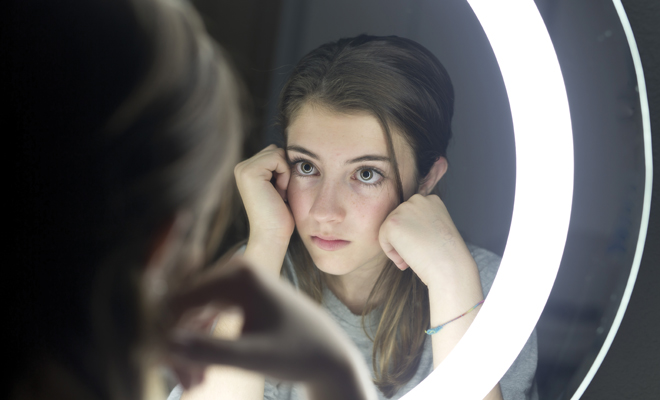
Somebody Take Charge: Teaching our Teens Positive Body Image
Amelia is bright, funny and shy until you get to know her. At 14, she’s not medically overweight, but noticeably larger than some of her classmates. At school, she must wear a uniform that doesn’t fit or flatter her body and her mother often quips, “Are you going to eat that?” Recently, her dance teacher told her that although she was proud of Amelia for working so hard in class, her bigger size wasn’t appropriate for the lead in the recital.
Like bodies, body shaming comes in all shapes and sizes. Approximately 94 percent of teenage girls in America have been guilted for the way their bodies look by their family, teachers and peers. So, by the time a girl heads to college, whether she’s overweight or thin, she will experience lasting negative body image.
Although girls and boys face significant pressure to look attractive, it’s no secret that body shaming is more prevalent for females. A girl’s quest for a “good” body or figure can take a heavy toll, even if someone seems to have it all together.
Girls go through emotional and physical changes in their adolescent and teenage years, so maintaining a healthy body image can be hard. Since a person isn’t born with a certain body image, our environment, circumstances and surroundings can convey either positive or negative messages about our bodies.
Society’s standards of beauty often come from what we see in social media, TV, magazines and commercials, so girls tend to feel bad about not meeting those standards. A recent study in the Lancet Medical Journal showed there is a strong association between social media and depression for female teens. Compared to girls who spent one to three hours on social media a day, girls who spent three to five hours showed a 26 percent increase in depressive symptoms.
The link between social media and severe dieting, eating disorders and excessive exercise is strong. Some females are triggered by social media and are especially vulnerable. As parents and family, it is our responsibility to educate young people on how social media use could be making them feel about themselves and how this could be linked to stringent dieting, eating disorders, excessive exercise and depression. Most experts agree that girls who have a positive body image are connected to solid family support and an overall healthy outlook on fitness and wellbeing. Educating our kids about how social media use could be making them feel about themselves is very important.
Let’s face it. We have smart kids, and by the time they are old enough to listen they can tell if we are “full of it” or not. Indirectly, what we show them is considerably more important than what we say. Even if we are telling them all the right things, our behavior can dramatically affect a girl’s self-esteem. Offhand comments about developing bodies, weight, shape and how clothing fits are all influencers on a young mind in a negative way.
The old adage that actions speak louder than words is emphatically true for a growing girl. Seeing mom chastising herself about her weight, calling herself fat or even grimacing as she looks at her figure in the mirror can cause repercussions for years. It doesn’t mean we can’t be genuine and logical, but it does mean we have to pay more attention to the image we portray to those who look up to us.
When girls obsess about their bodies and how they measure up to everyone else’s, it takes away their ability to concentrate on other pursuits. For daughters struggling with a negative body image, consider professional counseling. Additional support might give her the tools she needs to feel good about her body and herself. ■
Sources: pbs.org, mayoclinic.org and medicalnewstoday.com.
Maintaining Communication
Unfortunately, at a time when most teenage girls significantly decrease the amount of communication they have with their parents, discussing positive body image is crucial. Certain strategies can help our daughters be more comfortable in their own skin.
- Talk about social media, TV and other outlets and how these images may affect them.
- Monitor what our daughters are watching and reading and discuss questioning what she sees and hears.
- Talk about who she is, not what she looks like.
- Discuss normal body weight for growing girls and developing bodies.
- Set rules about what our daughters post and view on the internet or social media.
- Talk openly about how healthy bodies come in all shapes and sizes.
- Ask her what she likes about herself and tell her what you like about her.
- Rather than saying words like “fat” and “thin,” use positive body language, promote healthy eating and staying physically active.
- Make sure other family members and friends also follow these strategies.







